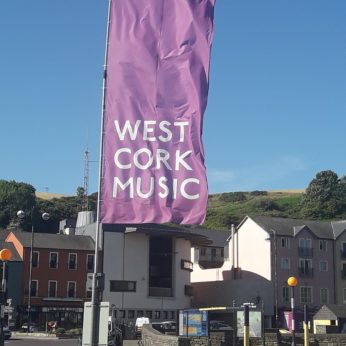Composer: György Kurtág (b. 1926)
Performance date: 07/07/2018
Venue: St. Brendan’s Church
Composition Year: 1981 - 2
Duration: 00:21:48
Recording Engineer: Ciaran Cullen, RTÉ
Instrumentation: 2vn, va, vc
Instrumentation Category:Small Mixed Ensemble
Instrumentation Other: sop, vn, db, cimb
Artists:
Luigi Gaggero -
[percussion]
Niek de Groot -
[double bass]
Nurit Stark -
[violin]
Caroline Melzer -
[soprano]

Caroline Melzer [soprano]
Nurit Stark [violin], Niek de Groot [double-bass], Luigi Gaggero [cimbalom]
György Kurtág [born 1926]
Scenes from a Novel Op.19 [1981-2]
15 songs to poems by Rimma Dalos
1. Come
2. From meeting to parting
3. Supplicatio
4. Allow me
5. Counting-out Rhyme
6. Dream
7. Rondo
8. Nakedness
9. Hurdy-Gurdy Waltz
10. Tale
11. Again
12. Sundays without End
13. Visit
14. True Story
15. Epilogue
The fifteen poems describe with a sardonic eye, but in helpless desperation, the sad familiar story of ill-conceived love and its sorrowful disintegration. Each song is a polished jewel as the unusual ensemble is exploited to embellish the singer’s tale. The solo violin helps describe the first song’s invitation to a shared warmth. The second song, From Meeting to Parting, shares the words of the final song but not the music, here a leaping molto agitato beating of the heart waiting, endlessly waiting. Supplication uses long slow glissandos in bass and violin to add an eerie backdrop to the prayer for forgiveness. Fifty-three seconds is the timing for the fourth song: Allow me to touch you, to melt, to dissolve in you. The electrical impact of that contact shudders in the music and then the violin soars off into space, so much from so little. The fifth song is in homage to Mahler, as the thunderous opening and fiery march-like rhythm will tell you, a Mahler Scherzo full of irony, insolence and lamentation ending with a mighty fff conclusion, all in sixty seconds. The Dream that turns to nightmare is summoned up with a full armoury of instrumental and vocal techniques, a virtuoso display. Rondo is by far the longest and most ambitious song, the infuriated realisation of helplessness is the Rondo theme while the waltz leggiero, grazioso brings back the memory of romance. The long final section combines the two ideas in music of calm beauty fading gradually to nothing.
The cycle is built like an arch whose apex is the eighth song, Nakedness, two phrases from the unaccompanied singer, paradise lost in one breath. The ninth song is in homage to Schnittke, still with us when this waltz was written, a reminder of the grim waltz from his Piano Quintet. The tenth song matches the dream of the sixth song, only now it is no longer fantasy but bitter reality that the music relentlessly emphasizes. Again is another waiting song, the impatient col legno tapping of the violin and the wild excess of the last bars showing the growing despair of the woman. Sundays without end is a miserable perpetuum mobile, round and round she goes. The five bars of the thirteenth song, Visit, match the glissandos of the earlier Supplication, this time the other-worldly effect is created by the violin’s harmonics. The beating heart motif from the second song returns for the final admission in the penultimate song True Story that all is over, the song ending with a long 8-bar instrumental postlude. The Epilogue repeats the words of the second song – From meeting to parting, from leave-taking to awaiting, that was my woman’s lot. – to a desolate descending scale, concluding with the bass.
Francis Humphrys
Copyright © 2025 West Cork Music. All rights reserved.
Designed and developed by Matrix Internet